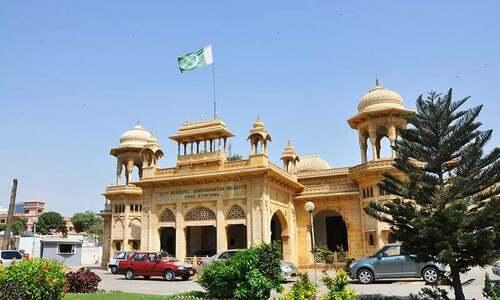ISLAMABAD: The Supreme Court has asked the chairman of the Evacuee Trust Property Board to appear before it on Tuesday (today) to explain the alleged sale of a Hindu property in Karachi.
“Under what law the properties belonging to the minorities are being sold,” wondered Chief Justice Gulzar Ahmed during the hearing of a petition submitted by Dr Ramesh Kumar Vankwani complaining that the apex court’s directives about the protection of properties belonging to minority communities were not being implemented. Dr Vankwani is the patron of the Pakistan Hindu Council (PHC).
He approached the court with a plea to ensure the implementation of a 2014 judgement which spelt out guidelines for the government to promote religious and cultural tolerance in society by developing curricula for schools and colleges.
The judgement had proposed a task force for promoting tolerance and establishing a police unit to protect the minorities’ places of worship.
The petitioner claimed an inquiry had found that the ETPB had forged documents to prove the Sindh Heritage Department issued a no objection certificate (NOC) for the demolition of a Dharamshala – a shelter for Hindu pilgrims – in Karachi. The piece of land, spread over 716 square yards, was then handed over to a builder for the construction of a shopping centre.
On June 11, the Supreme Court had ordered the Sindh government’s Heritage Department and the ETPB not to demolish any part of the Dharamshala, in Karachi’s Saddar.
The apex court had directed Karachi’s commissioner to take over the building so that no person trespassed upon the premises.
In his application, Dr Vankwani requested the apex court to transfer control of the premises to the management of the nearby Baghani Temple. He called for an inquiry by the Federal Investigation Agency (FIA) into the alleged forging of documents and demolition of the heritage property by the ETPB.
The applicant said the Evacuee Trust Property Board had not complied with the court’s directive that the ETPB release an amount of Rs38 million to the (PHC), which it had incurred on the construction and restoration of the Samadhi (shrine) of Shri Paramhans Dayal Ji Maharaj (Teri temple) in Karak, Khyber Pakhtunkhwa.
The KP government had given a grant of Rs 2 million to the PHC for the restoration work, which cost a total of Rs40 million.
“But unfortunately ETPB has not paid the balance amount of Rs38 million to PHC even though eight months have elapsed since the issuance of the order (on Feb 8),” Dr Vankwani alleged.
He urged the Supreme Court to issue a fresh directive to ETPB for payment of Rs 38 million to PHC and to initiate contempt proceedings against the organisation.
The applicant informed the court that a total of 1,831 temples and Gurdwaras were under the ETPB’s jurisdiction, but only 31 of them were being used for worship these days. The remaining have either been closed down, encroached upon or given on lease to a third party.
The petitioner complained that a man by the name of Mahboob Qazi, who claimed to be a government employee, had hurled death threats against him. “His (Qazi’s) hit men came to my apartment in Karachi’s Bath Island last week and thrashed my guards,” Ramesh Kumar Vankwani stated.
The Supreme Court asked the Inspector General of Sindh to submit a report about the threats on Tuesday (today).
Published in Dawn, November 16th, 2021















































